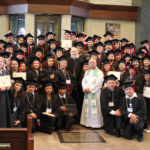
We begin the annual commemoration of Respect Life Month tomorrow, Oct. 1, during an ongoing pandemic that challenges us to reflect on our response to respecting life beyond our families and the people with whom we agree. We need to “see the humanity, not the politics” in the unborn child, the immigrant, the refugee, the individual with a mental health issue or a physical illness or disability, and the prisoner.
We need to “see the humanity, not the politics” in the front-line workers in grocery stores, restaurants, retail outlets and other businesses. We need to “see the humanity, not the politics” in the airline workers, delivery and repair workers, healthcare providers, teachers, school board and city council members. We need to “see the humanity, not the politics” in single-parent families, the homeless and senior citizens struggling with limitations.
“See the humanity, not the politics” is a phrase that appears in an essay written by Sister Donna Markham, OP, president and CEO of Catholic Charities USA (America, Sept. 22, 2021). Her column focused on the plight of refugees and immigrants, but her observation applies to all of humanity. “The staff and volunteers at Catholic Charities member agencies across the country are doing God’s work and answering Pope Francis’ call,” she wrote. “They see only an ‘us’ in the United States as they care for the most vulnerable affected by natural disasters, food insecurity, homelessness and any life event that places them at risk.”
The U.S. Conference of Catholic Bishops chose “St. Joseph, the defender of life,” as the theme for this year’s Respect Life Month, in keeping with the Year of St. Joseph. His actions spoke louder than words as the patriarch of the Holy Family, listening to God and responding with sacrificial love. We demonstrate sacrificial love through actions — prayers, education, legislative advocacy, donations and/or service — in our respect for life from conception to natural death.
In a recent presentation on Pope Francis’ encyclical, “Laudato Si,” Deacon Frank Agnoli of Davenport said the Holy Father emphasizes the principle of the common good, which means to ensure that everyone has what they need to live a fully human life. Achieving the common good, and thus showing respect for life, requires us to make changes in lifestyle and the way we do business.
Case in point: On Sept. 24, Archbishop Paul R. Gallagher, Secretary for Relations with States of the Holy See, gave a pre-recorded video message to the United Nations for the High-Level Dialogue on Energy. In his message, he said 759 million people live without electricity. “As called for in the 2030 Agenda for Sustainable Development, to eliminate poverty and hunger, we must ensure that every family and household has sufficient access to affordable and reliable energy.”
“Energy access also depends on affordability and pricing. The poor, including those on the peripheries of society in developed countries, often cannot afford the energy needed for daily life. Therefore, reasonable energy pricing, ethical business practices and subsidies for the poorest are essential,” he said.
Sister Markham, in her essay published during National Migration Week (Sept. 20-26), urged readers to “re-examine your heart to feel the emotion of the newcomers…. These are families so desperate to leave their homes that they put their children at risk to escape and leave with only the clothes on their backs, often in the dead of night…. Like many of us, they are the faithful — desperate to seek a life without fear of reprisal for their beliefs.”
We also need to urge Congress to reject the so-called “Women’s Health and Protection Act” (HR 3755/S. 1975), which would impose abortion on demand at any stage of pregnancy. The bill would also force Americans to pay for abortions here and abroad with their tax dollars (Iowa Catholic Conference newsletter, Sept. 22). The bill has little chance of passing in the Senate, but we still need to send a message to our Congressional delegation (congress.gov) objecting to this dehumanization of the unborn child.
Finally, check out the USCCB’s Respect Life web page (usccb.org/resources/respect-life-month-action-guide) for resource materials that include a list of questions to reflect on: Do we realize how precious every person is? As we go about our day, do we treat people accordingly? How can we help those in our society who are struggling to welcome new life, like moms who are pregnant or parenting in difficult circumstances? How can we reach out to those having a hard time seeing the worth of their own lives? How do we reassure those at the end of life who are afraid they are a burden or feel like their lives don’t have meaning?
We need to “see the humanity, not the politics” in the unborn, the born, the dying and everyone in between.
Barb Arland-Fye, Editor
arland-fye@davenportdiocese.org











